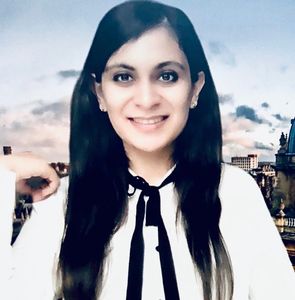
Welcoming Akanksha to the TRANSNET family
Meet our latest team member: Akanksha Ahuja, who is currently pursuing her PhD at the Department of Engineering in the University of Cambridge.
What are you most looking forward to as a new member of the TRANSNET Programme?
TRANSNET benefits from the expertise of domain experts in optical networks and artificial intelligence, and together we can discover, innovate and implement ideas that will serve the technical and data requirements of an ever-growing global digital economy and society. It is phenomenal to be a part of something that will have quantifiable and tangible outputs and positively shape the future of communication in the coming years on a global scale.
As a part of TRANSNET, I look forward to implementing my research ideas and getting feedback from an amazing community of experts. During my time as a PhD student, I aim to identify the knowledge gaps and opportunities at the intersection of machine learning for communication systems, present findings to a range of stakeholders, promote more women in engineering, and collaborate with researchers across academia and industry. To build my expertise and professional network, I hope to team up with researchers and other PhD students across the UK to integrate nationwide accessibility, long-term sustainability and maximum efficiency of telecommunication networks.
What will you be working on? (a few details about your research)
We aim to use graph-based signal processing, topology data analysis, network science and artificial intelligence techniques to model the optical networks and their properties. We will first focus on solving problems such as failure detection and traffic prediction in communication systems using state-of-the-art machine learning architectures. Second, we aim to investigate how we can combine data from optical networks with other open datasets to fulfil the sustainability and accessibility targets of telecommunication networks. Lastly, we aim to quantify the characteristics of optical networks through the lens of complexity science.
What were you doing before?
I am currently pursuing a PhD at the University of Cambridge and have previously worked in research labs in India, Switzerland, Bulgaria, Greece and the UK. My research background covers developing machine learning and computational tools and pipelines for communication systems, climate physics, and particle physics. Previously, I completed my MSc in Computer Science at the University of Oxford with CERN, where I worked on graph representational methods for future circular colliders. Before this, I worked as a computer science engineer at CERN in the AWAKE and CMS Experiments. At present, I am working in the Department of Engineering alongside British Telecommunications to develop methodologies for decoding the complexities of digital communication systems.
What’s the biggest challenge you’ve experienced in your career so far?
All roads are filled with uncertainties; no matter how much one could have planned, there are surprises and delays along our journey. Therefore, all uncertainties can be challenging because, usually, as humans, we are wired to seek more security. On a single day, it could be as simple as asking yourself how you would make your experiment work, and in the long term, how would you ensure you are doing the right thing and moving in the best direction possible? As I evolve, I plan to keep refining my answers to the bigger questions and get comfortable out of my comfort zones.
And your proudest achievement?
My most memorable achievement was when my professors and family were beyond happy for me after I won a research competition based on a smart dustbin for women’s healthcare, and I was further fully funded to present my work in Brussels, Belgium. This achievement is particularly special because I was wholeheartedly supported and cheered on by the people who meant the most to me, and it was a major turning point in my life. It was the first time I had won a massive international scholarship, and the experience motivated me to work harder, dream bigger, go beyond the self-imposed limitations of one’s abilities and find opportunities despite financial constraints.
What do you like to do outside of work?
Our world is not perfect, but that doesn't mean it can't be engineered to be better than before, so I usually volunteer my time to work for the United Nations Sustainable Development goals to work on climate change and gender equality projects. Often we focus more on what's going on in our external environment but rarely look within ourselves, not knowing our perception of our world is defined by how we are inner-engineered by our thoughts, beliefs, memories and interpretations of past experiences. To explore more about the human mind, decision making, and productivity, I enjoy reading and watching documentaries about human psychology in my free time.